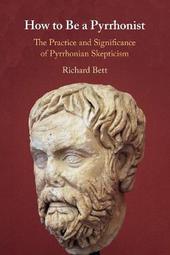
|
How to Be a Pyrrhonist: The Practice and Significance of Pyrrhonian Skepticism
Paperback / softback
Main Details
| Title |
How to Be a Pyrrhonist: The Practice and Significance of Pyrrhonian Skepticism
|
| Authors and Contributors |
By (author) Richard Bett
|
| Physical Properties |
| Format:Paperback / softback | | Pages:279 | | Dimensions(mm): Height 228,Width 151 |
|
| Category/Genre | Western philosophy - Ancient to c 500
Ethics and moral philosophy |
|---|
| ISBN/Barcode |
9781108457064
|
| Classifications | Dewey:186.1 |
|---|
| Audience | | Professional & Vocational | |
|---|
| Illustrations |
Worked examples or Exercises
|
|
Publishing Details |
| Publisher |
Cambridge University Press
|
| Imprint |
Cambridge University Press
|
| Publication Date |
8 April 2021 |
| Publication Country |
United Kingdom
|
Description
What was it like to be a practitioner of Pyrrhonist skepticism? This important volume brings together for the first time a selection of Richard Bett's essays on ancient Pyrrhonism, allowing readers a better understanding of the key aspects of this school of thought. The volume examines Pyrrhonism's manner of self-presentation, including its methods of writing, its desire to show how special it is, and its use of humor; it considers Pyrrhonism's argumentative procedures regarding specific topics, such as signs, space, or the Modes; and it explores what it meant in practice to live as a Pyrrhonist, including the kind of ethical outlook which Pyrrhonism might allow and, in general, the character of a skeptical life - and how far these might strike us as feasible or desirable. It also shows how Pyrrhonism often raises questions that matter to us today, both in our everyday lives and in our philosophical reflection.
Author Biography
Richard Bett is Professor and Chair of Philosophy at The Johns Hopkins University. His translations of works by Sextus Empiricus include Sextus Empiricus: Against the Logicians (Cambridge, 2005) and Sextus Empiricus: Against the Physicists (Cambridge, 2012), and he is also the editor of The Cambridge Companion to Ancient Scepticism (Cambridge, 2010).
Reviews'Everyone who works on ancient skepticism will want to spend time with these essays. Bett has a sure instinct for questions that matter, and he knows the works of Sextus backwards and forwards. Cambridge University has done scholars a great service with this volume.' Bryn Mawr Classical Review
|